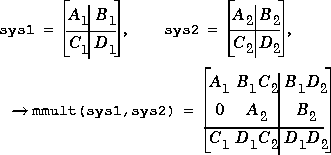

| Mu Analysis and Synthesis Toolbox |   |
Multiply CONSTANT, SYSTEM, and VARYING matrices
Syntax
Description
mmult allows the multiplication of matrices, mat1 and mat2 regardless of their type, provided their dimensions are compatible. CONSTANT, SYSTEM and VARYING matrices can be multiplied by one another based on the following table:
|
mat2 |
CONSTANT |
SYSTEM |
VARYING |
|
||||
| CONSTANT |
yes |
yes |
yes |
|
| SYSTEM |
yes |
yes |
no |
|
| VARYING |
yes |
no |
yes |
For compatibility, the number of columns of mat1 must equal the number of rows of mat2. In the case of SYSTEM matrices, the number of inputs of mat1 must equal the number of outputs of mat2. (An alternative term for the multiplication of two SYSTEM matrices is cascade.) Similarly restrictions apply for VARYING matrices. Up to nine matrices of compatible dimension can be multiplied via the same command by including them as input arguments.
Pictorial Representation of Function

Examples
The multiplication (cascade) of two SYSTEM matrices is shown below.
seesys(p1) -1.0e+01 | 1.0e+00 ----------|---------- 1.0e+01 | 1.0e+00minfo(p1) system: 1 states 1 outputs 1 inputsseesys(p2) -3.0e+00 | 2.0e+00 ----------|---------- 4.0e+00 | 1.0e-01minfo(p2) system: 1 states 1 outputs 1 inputsout=mmult(p1,p2)seesys(out,%5.2g') -10 4 | 0.1 0 -3 | 2 ---------|------ 10 0 | 0
Algorithm
mmult uses the MATLAB " * " command when the multiplication does not involve two SYSTEM matrices. The equation for the multiplication of two subsystems is given by

See Also
*, abv, madd, mscl, msub
 | minv, vinv | mprintf |  |